Molly: Summertime of the Condor
Often I or Paul or both of us will agonize over the movie list (which, if I haven't mentioned, is a real list, not just the noncommittal "ah I'll add it to the list" list you mention when people recommend you something and you only sort of care). Paul's issue, usually, is that everything on there seems depressing. That's because at least 3/4 of it are my additions. Or we'll just whine too much about "wah I don't know anything about it, what's it about, wah." But I'm trying to have more of a "why not take a crazy chance" spirit about it all lately! We're never going to be Millennial Carrie Coon and Tracy Letts at this rate! The last two we picked without over-thinking it were good.
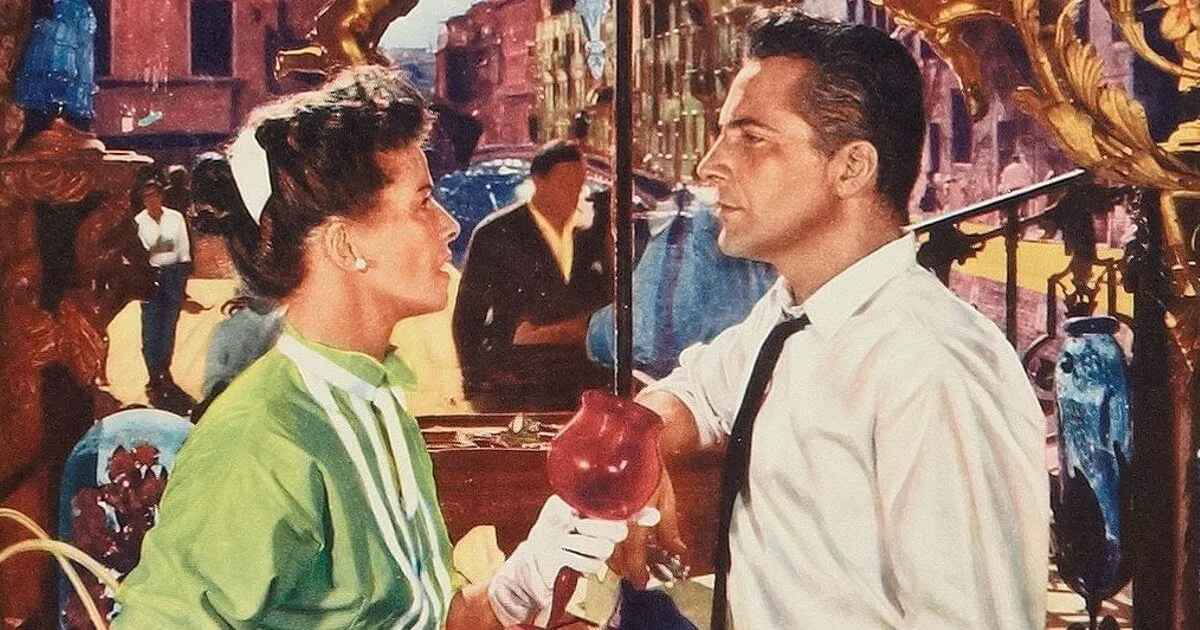
Summertime (1955)
One of the many sad things in life that I can't do anything about is that I missed the chance to go to Venice before it was ruined by tourism and before climate change was quite so dire. Whenever I'm thinking of was probably full of people claiming the tourists were ruining it, too, but as a tween I was obsessed with Venice. I saved pictures of it on my old family desktop computer, and I loved fantasy YA books set in versions of it. Later I would move on to Donna Leon's Commissario Guido Brunetti series, which was just as much a fantasy to me. I won't fully believe it until I see it. We don't know how Katherine Hepburn's Jane Hudson daydreamed about Venice or any other stop on her solo European vaction in Summertime, but she arrives in the floating city with same sense of shock that it really exists. Venice is the tail end of a European vacation Jane has saved up for, maybe for years. As a "fancy secretary" from Ohio, she is not going to get to do this again soon, or ever.
Summertime is a romantic dramedy, though I would call it a drama with a light touch. There is a romance, but it's fully Katherine Hepburn's show. Jane, maybe Hepburn playing herself to a large extent, is so materialized. Before we understand the depth of her fragility and loneliness, we see that she is by no means languishing. Paul once asked me if knowing yourself and knowing that you know yourself are different things. I think they are, and Jane Hudson knows that she knows herself. Her personal style, her bearing, and her wry friendliness have long been broken-in. If I saw Jane or met her in passing I would be floored for days at how cool she is, at how wonderful it would be if I could age into anything like her.
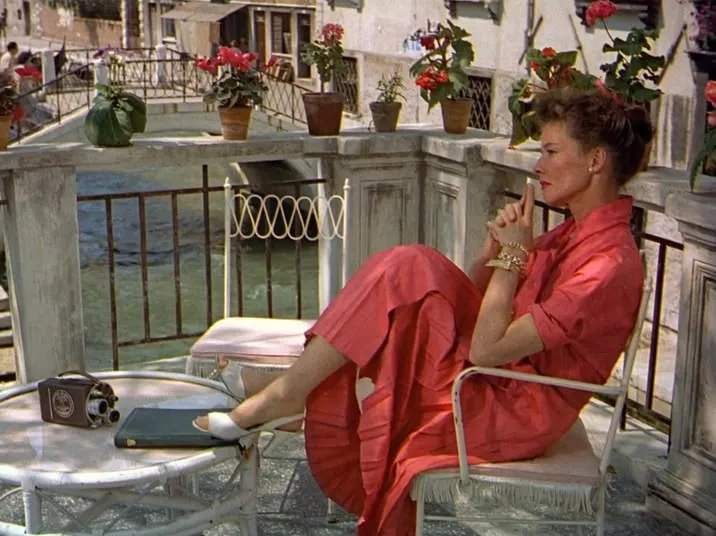
Jane settles in at her guest house in Venice, managed by a chic widow. Her fellow lodgers are two married couples: bumbling elderly American tourists, and an artist with his younger, poutily glamorous wife who seem to be on an extended stay rather than a vacation. Jane has an immediate, friendly rapport with everyone and she seems drawn to the proprietress, a fellow independent woman who gets to/has to run her own life. But when everyone disperses to their own evenings, Jane confronts herself.
Summertime is a supremely delicate and generous portrait of a particular kind of loneliness. Everything about Jane's character, down to her idle gestures and postures, speak of someone who is utterly comfortable with themselves and confident in their own taste. We can see the gears turning. She didn't come to Europe looking for love, or to complete herself, but after traveling all this way with her crystallized wholeness intact, she realizes she's missing something.
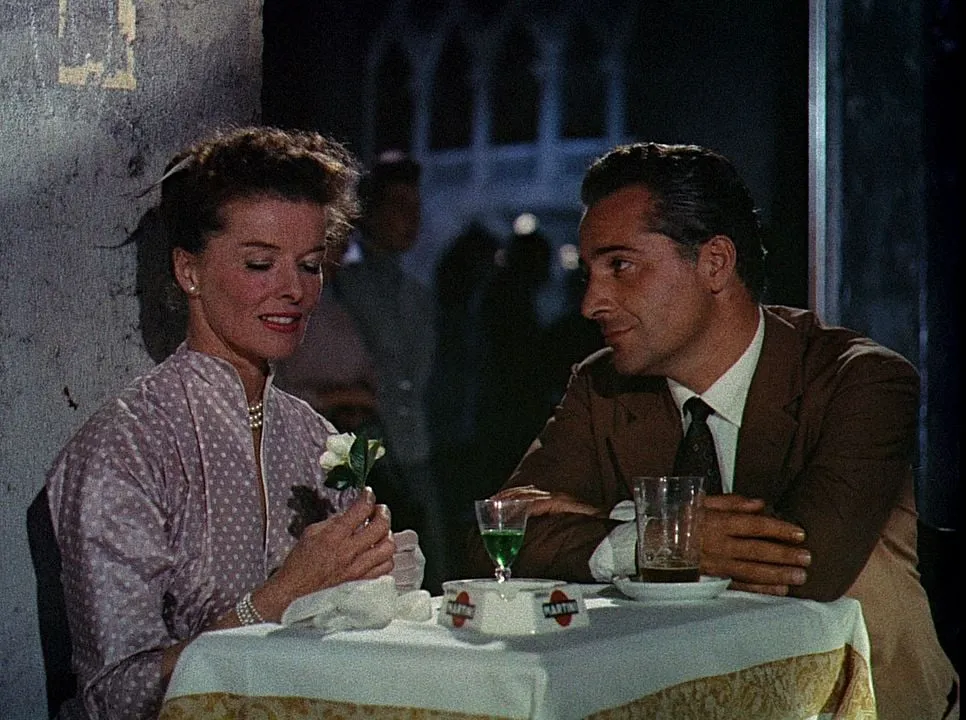
I've already written too much without mentioning the romance. On her first night, Jane sits at loose ends in the Piazza San Marco. An elegant Venetian man of approximately her age notices her, and she notices him. He turns out to be Renato, the owner of an antiques shop she visits the next day. A red goblet catches her eye and Renato promises to find her if he sources a partner for it. They both know it's an excuse, but they play along. When the night to go on a real date finally arrives, a gloriously dressed and manicured Jane waits in the piazza. Renato's nephew arrives to tell her that he's running late because his sister is sick. And the nephew is actually his son, oops! That's how Jane learns that Renato is married. She runs away in anger only to arrive at her guest house in time to eavesdrop on the owner and the artist, who are having an affair. Jane is discouraged and disgusted.
One of my favorite scenes takes place between Jane's discovery that Renato is married and her return to the guest house. She stops at a bar to wallow and runs into the artist's wife doing the same. For just a few minutes, Jane lets the full force of her disappointment and embarrassment wash over her. She snaps at the younger woman, telling her that even if she has problems, she is lucky to be having them as a pair. She shakes herself back into a version of her normal good humor, but the flash of bitterness and raw loneliness is powerful and painfully human.
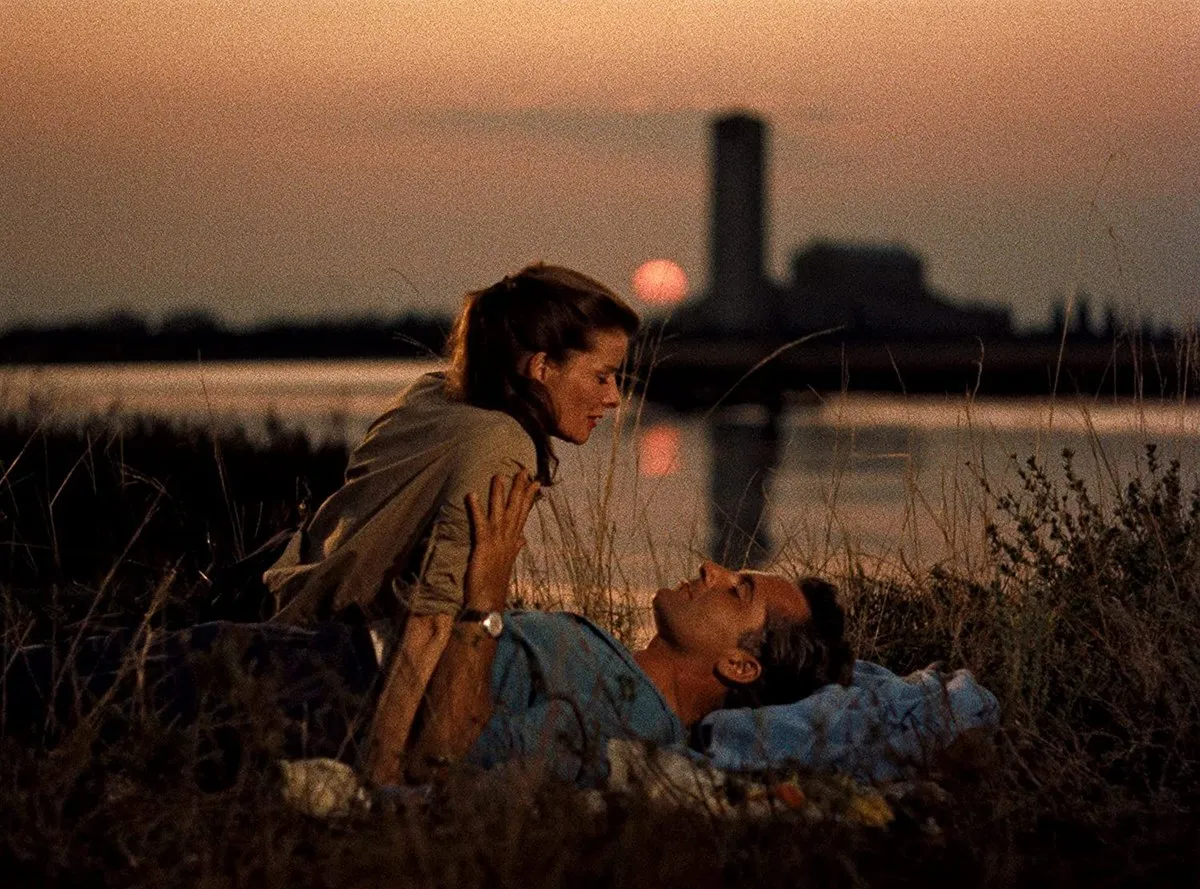
Renato rushes to the guest house to explain that he and his wife live apart. Why not take the chance they've been given? Rossano Brazzi is very good in this role. For most of the film, you're never quite sure if Renato is sleazy or not. His features are so Italianately handsome that it seems too good to be true. But Brazzo also imbues Renato with a gentleness and melancholy that lets us see that like Jane, he may carry himself with confidence and style, but he's lonely. Jane gives in, they go dancing, and end the night watching fireworks on Renato's balcony. The tasteful sign that Jane is ready to consumate their relationship is a shot of her red high-heeled shoe left on the terrace.
Their affair takes up last third or so of the movie, maybe days or a week and change in Jane's life. We feel how short this time of love and freedom is for both of them. It ends suddenly, by Jane's own design. She says she's spent her life never knowing when to leave the party and lingering too long. This way, like a goblet of Murano glass, her experiene with Renato and the ways Venice has changed her will be shaped and perfected by her.
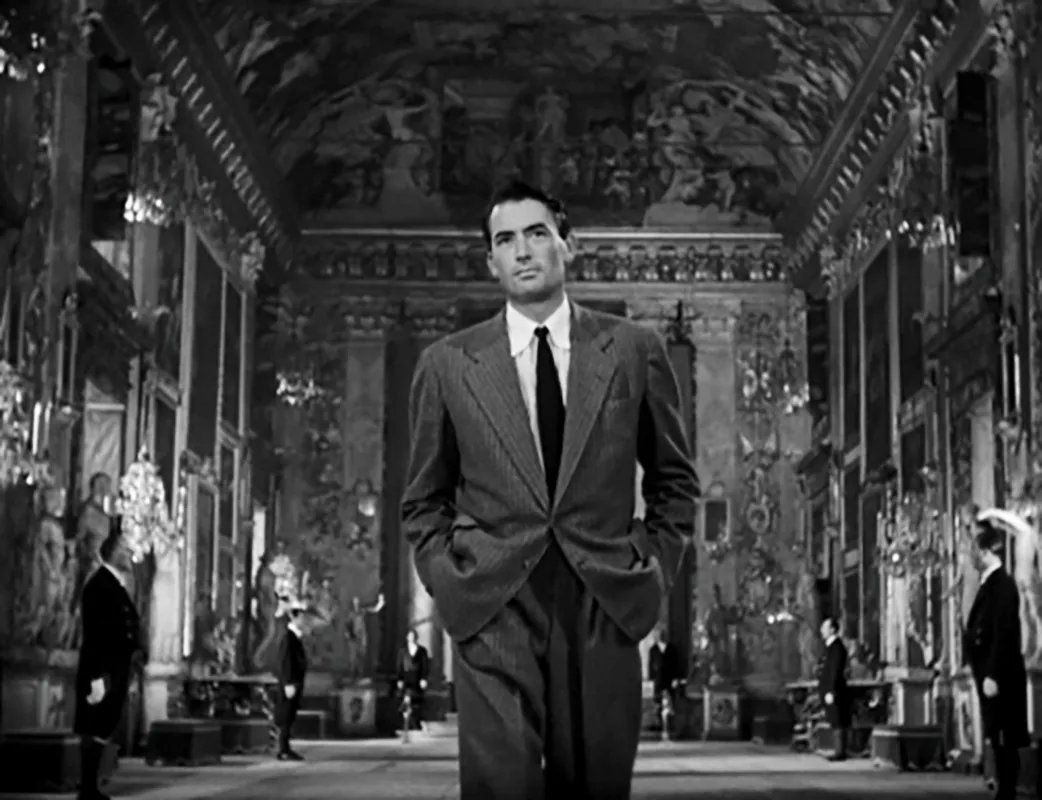
I can't help but think about the other romantic Italian vacation movie that ends with a character walking away from romance. Summertime's contemporary, Roman Holiday, is one of my favorite movies of all time. It is also sometimes called a romantic comedy, even though it's more drama, and more charming than funny. Every time I watch it, I am in danger of cutting my bangs really short. I did in fact go into a Japanese salon once and mention ローマの休日 and my stylist knew exactly what I meant. Paul watched it very early in our relationship and now he can hang with me when I say "you should always wear my clothes" or "by all means, Rome." And though I have an enduring, perhaps college girl dorm posteresque attachment to Audrey Hepburn and think she is captivating as Princess Ann, Gregory Peck's Joe Bradley is the Katherine Hepburn of Roman Holiday.
Ann's dilemma is breaking free, all too briefly, from a life where she knows exactly what she is supposed to do. Joe Bradley and Jane Hudson are suffering from the loneliness of freedom. Jane's situation is far trickier. Even if both characters are visions of creative, independent people, it was a far riskier path to be a single, middle-aged woman in the 1950s. Still, they are both people who are working in or visiting beautiful cities, with the means to enjoy them. Both are missing something despite being confident in their own personalities and capabilities, though Bradley through overwork and an attachment to bachelorhood rather than timidity or being passed over in youth. Their romantic partners both happen to them with a serendipity that's rare in real life. Both learn something about themselves in a love they know can't last beyond these dreamlike interstices of life.
Gardenias feature throughout the film and in Jane's self-understanding. She picks one from a flower seller with Renato and tells him about how when she was young, she longed for a gardenia to wear to a ball, but it was too expensive. She soon after drops her prize in the canal. In the final scene, Jane looks out of her departing train window as Renato sprints down the platform with a gift. He isn't fast enough, but opens the box to hold up a gardenia. Jane mouths that she sees it, and unlike her earlier near misses, we know that to her, she's finally gotten her gardenia, her ball.

Three Days of the Condor (1975)
Sydney Pollack's spy thriller was on Paul's radar after a conversation in his dad group chat about Classic Dad Movies. I take issue with the dads on this one, though. Three Days of the Condor is for everyone. Watching it with a man could be the gender war version of the WWI Christmas truces. This is mostly thanks to Robert Redford, who am I sad I did not have a deai with when I was living about 15 minutes away from Tesuque, NM, where he has been known to show up. And I did teen writers' camp at Kenyon College so I am just always in the footsteps of legendary hot men!
Robert Redford is, I get the sense, on a shortlist of men that even other men will readily say is extremely attractive. Others include his screen partner Paul Newman, Toshiro Mifune, and Sean Connery. But I think Redford has the most wide-ranging appeal. It's not just his filmography, which includes romances like The Way We Were, action, and plenty of crowd pleasers - my husband is especially fond of Sneakers. He seems more plausibly husbandly or boyfriendly. For men, I think he's often in roles that reflect the idea of the coolest and hottest version of oneself more than a power fantasy (guys are always sharing that screenshot of Brad Pitt in Fight Club but I don't buy that anyone sees much of themselves in Tyler Durden). Three Days of the Condor is a perfect showcase of Redford's charms.
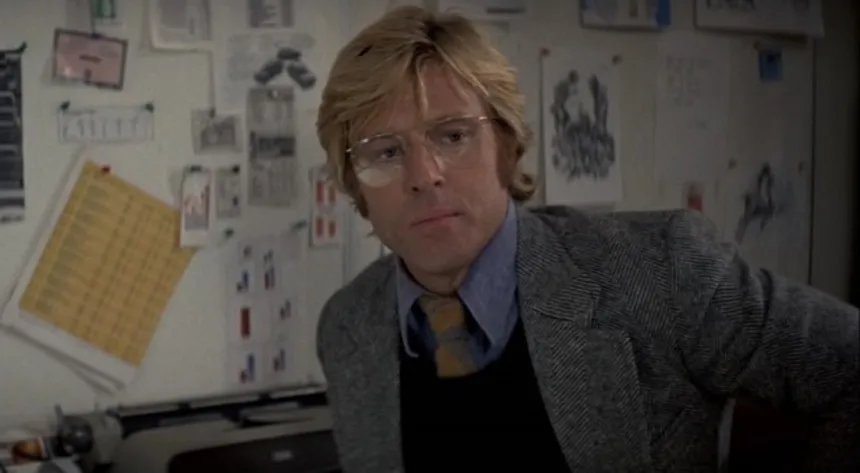
He plays Joe Turner, an analyst at the clandestine CIA office the American Literary Historical Society. Turner examines books and other printed media for similarities to real world intelligence operations, coded messages, or other notable inconsistencies and red flags. This job is so funny. It's the kind of job people make up in the replies to viral twitter threads about what your dream job would be or what you would do in a luxury communist space utopia. Is the American Literary Historical Society a Third Space? Is it an alcohol free queer space?? Throughout the film, he behaves like a very good spy despite not being one, to the point of almost outwitting an international assassin. He's so good because he's read everything ever about spycraft! The idea that you could outsmart everyone around you by being the best at your specialized, bookish job is so wholesome, to use a word I hate so if you know I'm using it you know I mean it. He's handsome and fit, yes, but also dressed in well-tailored but lived-in jeans, big glasses, and coats. If Joe Turner knows anything about Saville Row it's because he read it in a book. He's just a male sexy librarian.
It's very interesting, then, to see him paired with Faye Dunaway, who I think ranks among the least "everywoman" actresses ever. There are not many like her. That sounds like a stupid observation probably, but every time I see her in a movie I think about how unlike anyone I've ever met or seen she is. Something about her face always strikes me as elusive, like I can't fully comprehend her even as I look right at her. Earlier this year, I saw The Umbrellas of Cherbourg in the theater and was struck by Catherine Deneuve's blinding, but girlish beauty in it. The rest of her ouevre is so decidedly womanly. Dunaway has no such role. Even her playfulness has a calculating edge to it.
Three Days of the Condor leans fully into her chilliness and self-possession as Kathy Hale, a photographer who gets pulled into Turner's predicament against her will. There is a whole hostage situation born out of Turner's desperation to outwit the forces hunting him so I guess it's problematic. But they soon fall into a chemistry of both adrenaline and personality. What really seems to do it for her is that Turner sees something essential about her in her photographs. Here, again, is a fantasy. It's the fantasy of a man, maybe like Redford, looking deeply enough at you to understand you. If you relate to Redford's character, it's the fantasy of being the person who can solve a mystery other's could not.
Thinking about Dunaway's character next to Hepburn's in Summertime is interesting to me. In almost every way these movies are wildly different from each other but these female leads provide two interpretations of what it means to be a woman living independently, two decades apart. Both photographers, too! While Jane Hudson is more of an odd duck in 1955, Kathy Hale's resignation and loneliness still speak to an era where making your own way as a woman was full of new options, but not necessarily social approval, support, or an easy path to follow.
I don't want to say much more about the plot of Three Days of the Condor. It's a thriller, a mystery, a chase, and an "it goes all the way to the top!" conspiracy. I enjoyed my experience going into this movie knowing absolutely nothing and don't want to rob anyone else of that. The greatest endorsement I can give it is that the whole time, I really wanted to know what was going to happen.